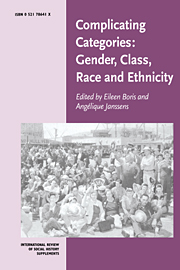Book contents
- Frontmatter
- Contents
- Notes on Contributors
- Complicating Categories: An Introduction
- Family Concerns: Gender and Ethnicity in Pre-Colonial West Africa
- Narratives Serially Constructed and Lived: Ethnicity in Cross-Gender Strikes 1887–1903
- Competing Inequalities: The Struggle Over Reserved Legislative Seats for Women in India
- “The Black Man's Burden”: African Americans, Imperialism, and Notions of Racial Manhood 1890–1910
- Sex Workers or Citizens? Prostitution and the Shaping of “Settler” Society in Australia
- From Muscles to Nerves: Gender, “Race” and the Body at Work in France 1919–1939
- “Blood Is a Very Special Juice”: Racialized Bodies and Citizenship in Twentieth-Century Germany
Competing Inequalities: The Struggle Over Reserved Legislative Seats for Women in India
Published online by Cambridge University Press: 14 January 2010
- Frontmatter
- Contents
- Notes on Contributors
- Complicating Categories: An Introduction
- Family Concerns: Gender and Ethnicity in Pre-Colonial West Africa
- Narratives Serially Constructed and Lived: Ethnicity in Cross-Gender Strikes 1887–1903
- Competing Inequalities: The Struggle Over Reserved Legislative Seats for Women in India
- “The Black Man's Burden”: African Americans, Imperialism, and Notions of Racial Manhood 1890–1910
- Sex Workers or Citizens? Prostitution and the Shaping of “Settler” Society in Australia
- From Muscles to Nerves: Gender, “Race” and the Body at Work in France 1919–1939
- “Blood Is a Very Special Juice”: Racialized Bodies and Citizenship in Twentieth-Century Germany
Summary
Introduction of the Women's Reservation Bill was stalled in Lok Sabha on Monday amid unprecedented scenes of snatching of papers from the Speaker and the law minister and the virtual coming to blows of members […]. As the shell shocked minister stood rooted to the spot, the member tore the papers with relish and flung them in the air provoking members from the treasury benches to storm the well. By this time, the well of the Lok Sabha looked like a veritable battle field with members from both sides preparing for a scuffle as the Speaker adjourned the House for the day.
What caused such a commotion in the lower house of India's Parliament in July 1998? The Women's Reservation Bill was an attempt to reserve thirty-three per cent of seats in Parliament and state assemblies for women. In a society characterized by many forms of stratification, demands for subreservations within the category of “women” for other disadvantaged groups have repeatedly squelched the bill's progress. Defining which social categories should be eligible for such reservations leads to heated disputes because these questions involve both emotional commitments to group identities and material calculations of group interests.
“Reservations” in India are affirmative action policies for disadvantaged groups, allocating government jobs, and, in some cases, university admissions and legislative seats to such groups. The groups currently benefiting from reservations include the lowest castes, officially dubbed “scheduled castes” (SCs), and geographically isolated groups known as “scheduled tribes” (STs).
- Type
- Chapter
- Information
- Publisher: Cambridge University PressPrint publication year: 2000



